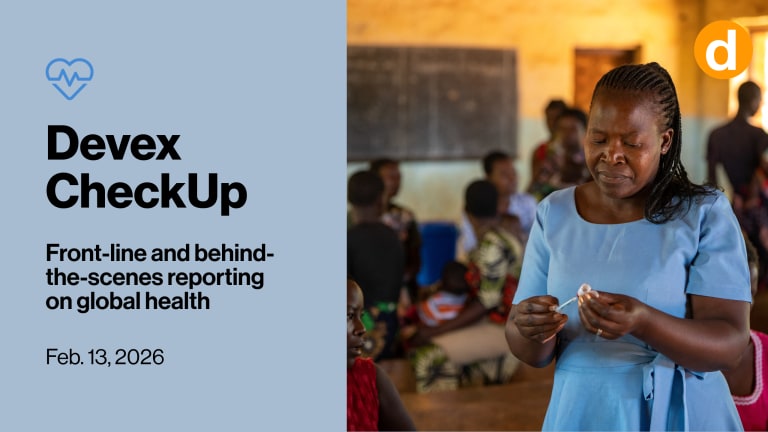
Tax avoidance by companies in the European Union is costing developing countries billions of dollars in lost tax revenues each year. That is the conclusion of a report launched by CONCORD, the European non-governmental organization confederation.
The report finds that in developing countries, between $859 billion and $1.138 trillion of illicit financial flows escaped developing countries in 2010 alone.
To put that in perspective, the report illustrates that this is 13 times the amount the EU and its member states spent on development aid in 2012.
In tax revenue alone, the report outlines, at least $100 billion was lost from developing countries through insufficient international tax policies.
“Europe cannot continue to give aid with one hand and take away with the other and tax policy is a classic example of where it’s doing this,” said Laust Leth Gregersen, chair of CONCORD’s working group on policy coherence for development. “Billions go to poor countries in aid only to return again to rich countries via tax dodging. The balance sheet shows that the poor in developing countries are losing out here.”
In an exclusive interview with Devex, Marcus Meinzer, senior analyst at the Tax Justice Network and speaker at the report launch event, argues that tax is the only sustainable long-term source of finance for development. He also suggests some measures to tackle illicit financial flows in developing countries and tax havens.
Here are a few excerpts of our conversation with Meinzer:
According to the Organization of Economic Cooperation and Development, poorer nations lose three times more money to havens a year than they get in aid. Can some of this money be reovered? What can countries do concretely?
There is certainly little doubt that the sums involved are enormous. Tackling the issue of illicit financial flows is, for developing countries, of crucial importance to address poverty.
To make sure that these flows stop and that money can be again taxed by developing countries’ authorities, we should introduce three sets of measures.
The first concerns transparency about the ownership, the real ownership of shell companies and trusts registered and created in the EU or in Western countries on behalf of developing country residents. These legal structures are routinely used to hide the identities of the people benefiting from accounts and controlling the accounts. By requiring a public registry of the real owners of all limited liability entities, as well as trust and foundations, we would go a very long way toward revealing and deterring this route for illicit financial outflows that are out of reach of any regulatory authorities in developing countries.
The second concerns the exchange of financial account-related tax information. This would allow tax authorities to routinely inform each other, including in developing countries, about financial accounts such as bank accounts of any other nation’s residents. For instance, if a South African has a bank account in the United States, we would require this bank account to be reported to the U.S. financial authorities and this information to be shared with the South African tax administration so that they can then assess whether the taxpayer … has properly declared this account and the income in his tax return …
The third is related to the transparency of multinational corporations’ annual accounts. There is a very strong resistance, under different pretexts, concerning increasing such transparency. Recent international debates show that this is an issue where developing and developed countries could ally politically quite easily, because both are losing money as a result of weak international tax rules, which are administrated and created to a large extent by the OECD. These rules are made for the benefit of the most powerful people and countries of the planet. A first step would be to shine a light into cooperate accounting [and] tax profit booking, by requiring the transparency that right now we simply don’t have …
The report’s recommendations call for the EU to support a “global regime of multilateral automatic information exchange” which tax havens need to sign up to. Can such a mechanism be put into place?
Yes, definitely. I think that once [Western nations] actually enact them and “walk the talk” themselves, then we can also move on quickly and easily to requiring other jurisdictions — such as those considered to be tax havens — to sign up to such a system as well.
What concrete measures can be taken by the EU to work with partner countries to maximize tax income?
I think the main measure the EU can take is related to the transparency of beneficial ownership. The European Commission has a very large political influence in the OECD and in the U.N. committee of tax experts, which is the ultimate legitimate decision making body on international tax rules.
The EU could play a leading role and could have a huge influence within the OECD, to make sure that a multilateral system for automatic information exchange is properly opened up for developing countries, without putting undue burdens on them.
Furthermore, we need to bring to light internal transactions between different parts of multinationals, by requiring a country-by-country breakdown of their operations. Country reports, among other things, would provide tax administrations in developing countries with a tool to quickly identify and tackle abusive avoidance by multinationals.
Can effective sanctions for noncompliance be imposed at the EU level?
Effective sanctions for noncompliance can certainly be imposed once we have implemented the right policies. At the moment, it would be a bit like throwing stones while sitting in a greenhouse for the EU to start speaking about sanctions. There is a lot for the EU and the U.S. to put in order in their own houses first, before sanctioning others.
What effect would tax stringency in developing countries have on remittances? Isn’t there actually a need in some fragile states for a black market economy and informal sending of money?
On remittances, I don’t know if this would have an effect, because remittances are not usually linked to bank accounts and not performed by multinationals. Remittance payments shouldn’t be affected by this kind of mechanism and measures should only apply to certain thresholds of assets or amounts.
It is not within the recommendations of the CONCORD report to require the disclosure of transactions; the report only requests to disclose the income.
Remittances are gifted and they wouldn’t be tracked by an automatic information exchange system because they aren’t related to a bank account. And even if they were, it wouldn’t be reported: If a resident of Germany, for instance, makes a financial transaction to a resident of Zambia, in no moment is the resident of Germany or Zambia assuming ownership of assets that are held abroad. The ownership title is transferred from one country to another — this is not problematic.
What can donors do to eliminate tax havens?
I think donors, especially private donors, need to consider what jurisdiction they use for routing their investments. There has been a recent set of initiatives in the Nordic countries and in Belgium that challenge the private sector seeking to invest in developing countries [placing] their funds in secretive jurisdictions that don’t allow transparent accounting and transparent [disclosure] of tax matters.
This is a way donors can review whether their own policies are consistent and coherent, and whether they start bypassing the budget of developing countries by avoiding tax through tax havens.
Often, as far as I am aware, the money that is sent by donors is tax-exempt in many respects. Such a practice should be reconsidered, especially concerning the foreign staff sent by Western nations, working as expatriates on developing country projects. It would be more consistent to make them pay national income tax as a national worker would do. This would also increase the incentives of donors to monitor the budgetary activities of the governments in developing countries, since they would need to give away a little of their money to their budgets.
How can a “redress mechanism” be put into place in order to assess, monitor and prevent incoherence?
I think it would be very important in many developing countries to set up specific task forces that would research the subject in detail.
The risk is that those commissions, if relying on external advice and expertise, would make the fox the guardian of the hen house. We would need to make sure that those commissions in developing countries are free from conflict of interest.
Can taxation be crucial for achieving the Millennium Development Goals in developing countries?
Absolutely. Countries with a higher share of tax have better human development outcomes.
In fact, tax is the only sustainable long-term source of finance for development. Access to credit and loans is limited, starting inflation to create money can also last only for a limited time, and relying on aid can have unintended consequences — especially for state building, since local governments will be held accountable to external influences and economic interests, rather than being accountable to local and domestic citizenry.
Will the issue be addressed in the post-2015 development framework? What pressure is being exerted since the G-8 and G-20 meeting discussions on tax and transparency? Is there the political will to see changes through? Is there a momentum?
I think the political momentum has never been bigger. Maybe after the G-8 there was a bit of deception, given the ambitious agenda, regarding beneficial ownership transparency. But in the post-2015 framework it seems that tax will play an increasingly prominent and important role.
[Former U.N. Secretary-General] Kofi Annan has called for tax and illicit financial flows issues to be placed quite high on the agenda after 2015. We have to see if it will be kept there, in the next couple of years.
OECD countries, including Germany and the U.S., are not very willing to have this topic placed very high on the agenda: They rather keep it in the realm of the OECD to control the discourse and be certain that the outcomes correspond to their interests.
We must remain alert, to see how the agenda will be consolidated or changed in the next two years.
Read more development aid news online, and subscribe to The Development Newswire to receive top international development headlines from the world’s leading donors, news sources and opinion leaders — emailed to you FREE every business day.








